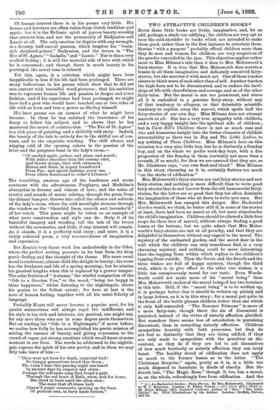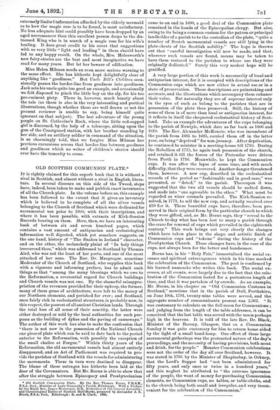TWO ATTRACTIVE CHILDREN'S BOOKS.*
Born these little books are lively, imaginative, and, let us add, perhaps a shade too edifying; for children are very apt to turn the cold-shoulder to books which are intended to make them good, rather than in the first instance to entertain them.. Stories "with a purpose" probably offend children more than they do men and women, for children are very suspicions of the powder concealed in the jam. This objection applies rather more to Miss Milman's tale than it does to Mrs. Molesworth's, fairy-stories. It is true that Mrs. Molesworth does secrete a lesson in all these imaginative and delicately conceived fairy.. stories, but she secretes it with much art. One of them teaches sisters to think more of each other than of self. Another teaches the high-born not to be discontented, and to endure the hard- ships of life with cheerfulness and courage, and so of the other. fairy-tales. But the moral is not too prominent, and above. all it is embodied in a genuine fairy-story, without any of that tendency to allegory, or that detestable scientific. tendency to explain away the marvel, which spoils half the fairy-stories of our own day. Miss Milman does not attempt marvels at all. She has a very true sympathy with children,. and a very happy insight into the spiritual side of children t. but in Uncle Bill's Children there is not so much ease and élan and humorous insight into the better elements of childish intractability as there was in Boy and The Little Ladies, to say nothing of Those Children. Miss Milman's hero on this occasion is a very nice little boy, but he is distinctly a Sunday boy, and on the whole we prefer week-day boys, with a due proportion of the Sunday in them (certainly not more than a seventh, if so much), for then we are assured that they are, as. Mr. Gladstone says, "our own flesh and blood." Miss Milman. in this story, charming as it is, certainly flutters too much. "on the skirts of edification."
Mrs. Molesworth's fairy-stories are real fairy-stories and new fairy-stories, and nothing is more difficult than to write good fairy. stories that do not borrow from the old immemorial fairy- stories, for the latter are so good that they too often dominate the imagination of those who sit down to write new ones. But Mrs. Molesworth has escaped this danger. Her Enchanted Garden would, we think, be better still if, in some of tin stories at least, there had been no moral at all, but mere stimulus for the child's imagination. Children should be allowed a little free scope for their love of marvel, without always finding a good. lesson at the bottom; but we quite admit that Mrs. Moles- worth's fairy-stories are not at all preachy, and that they are delightful in themselves without any regard to the moral. The mystery of the enchanted garden, and the secret door in the wall which the children can only sometimes find, is a very charming mystery, and nothing could be more interesting than the tapping from within which replies to the children's tapping from outside. Then the forest and the dwarfs and the three wishes are full of happy mystery, though the third wish, which is to give effect to the other two wishes, is a, little too conspicuously moral for our taste. Even Words- worth could not make more of his "moral being" than, Mrs. Molesworth makes of the moral being of her two heroines in this tale. Still, if the "moral being" is to be written up, it is perhaps better that it should be written up plainly and in large letters, as it is in this story ; for a moral put quite in the front of the battle pleases children better than one which is only half-concealed. "The Summer Princess" is more of a mere fairy-tale, though there the sin of discontent is punished, instead of the virtue of sisterly affection glorified. But somehow there seems less of ostentation in punishing discontent, than in rewarding sisterly affection. Children sympathise heartily with both processes, but they do not feel so distinctly that they are being edified, if they are only made to sympathise with the penalties on dis- content, as they do if they are led to ask themselves of how much brotherly or sisterly affection they can truly boast. The healthy dread of edification does not apply so much to the former lesson as to the latter. "The Christmas Surprise," again, pretty as it is, is a little too- much disposed to luxuriate in deeds of charity. But the fourth tale, "The Magic Rose," though it, too, has a moral,. is, on the whole, refreshingly free from edification. And the * (I.) An Enchanted Garden: Fairy Stories. By Mrs. Molesworth. Illustrated by W. J. Hennessy. London: T. Fisher Unwin.—(2.) lETnele Bill's Child-en. By Helen Milman (Mrs. Caldwell Crofton', Author of "Boy," "The Little Ladies," &.o. With Illustrations by the Author. London: Griffith, Ferran., and Co.
extremely limite 1 information afforded by the elderly mermaid as to how the magic rose is to be found, is most satisfactory. No less adequate hint could possibly have been dropped by an aged necromancer than this excellent person drops to the dis- tressed King who is in search of a magic rose for his wife's healing. It does great credit to his court that suggestions with so very little "light and leading" in them should have led to any happy result. On the whole, Mrs. Molesworth's new fairy-stories are the best and most imaginative we have read for many years. But let her beware of edification.
Miss Helen Milman needs an even more serious warning to the same effect. She has hitherto kept delightfully clear of anything like " goodiness." But Uncle Bill's Children occa- sionally passes the border-line from goodness into goodiness. Jack sets his uncle quite too good an example, and occasionally we felt disposed to pinch the little boy on the sly, for his too pre-eminent piety. There is, however, much beauty about the tale (as there is also in the very interesting and poetical illustrations, though whether these are well drawn or not the present reviewer is unable to say, being himself quite ignorant on that subject). The last adventure of the young people on St. Catherine's Rock, where the little red-capped girl is discerned, by the help of a telescope, sitting upon the gun of the Coastguard station, with her brother standing by her side, and an artillery soldier in command of the situation, is so charmingly told, that we forgive Miss 'Allman her previous excursions across that border-line between goodness and goodiness which no writer of children's stories should ever have the temerity to cross.



































 Previous page
Previous page